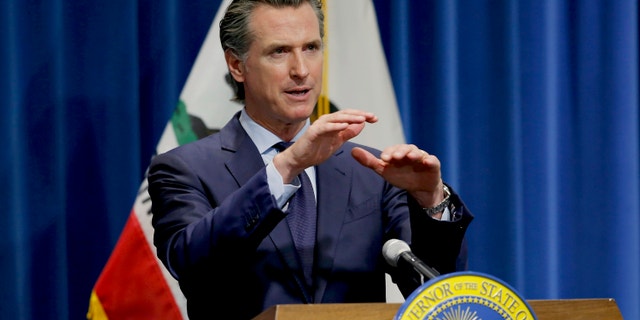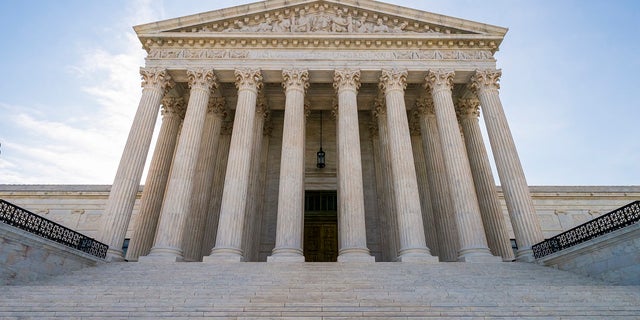The lawyer behind the federal lawsuit against an order by California Gov. Gavin Newsom mandating most of the state’s schools remain closed says that the action is meant to vindicate students’ “fundamental rights” allegedly taken away by the governor.
Newsom’s plan, announced in mid-July, requires a county to be off the state’s “monitoring list” for 14 days in order to open in-person instruction. As of Aug. 6, however, most of the state is on the monitoring list and it is unclear when the restrictions might be lifted, based on coronavirus data.
Newsom has said that “[l]earning is nonnegotiable” under his plan — which includes distance learning — and that it is important in-person instruction will only happen when “if it can be done safely.” But conservative lawyer Harmeet Dhillon, who is spearheading the suit against Newsom in federal court claims not only will students’ learning outcomes be harmed by remote learning, but that by preventing students from going to school, Newsom is violating their rights under both the Constitution and federal law.
“If you have a right under the law, a fundamental right, protected right, and your ability to enjoy that right varies according to some arbitrary criteria like where you live,” that is unconstitutional, Dhillon told Fox News in an interview. “So you’re living, for example, on the border of a county that is on the bad list. The county next to you, right across the border … across the street even, is not on that list. The kid in the house across the street gets to have a quality education in-person and you don’t.”
Specifically, she said, the geographic distinctions made under California’s system for opening schools run afoul of the equal protection clause of the 14th Amendment.
Dhillon also claims that California’s order violates another concept stemming from the 14th Amendment — substantive due process. Substantive due process is a complicated, controversial part of constitutional law, which Dhillon defines as the requirement that when the government deprives people of “a fundamental or what they call a quasi-fundamental right, such that, before the government takes away that right, they have to really have a good reason for doing that either subject to intermediate or strict scrutiny.” Intermediate and strict scrutiny are two concepts that define under what circumstances and in what ways a government may restrict a person’s rights.
The right to education is actually located in the California constitution, Dhillon says, and is also reinforced by previous rulings by the U.S. Supreme Court. And, Dhillon claims, the remote learning provided by school districts just isn’t a good enough education to satisfy the rights of California’s children.
“If you are a student, you are forced to undergo so-called, air quotes, ‘distance learning,'” Dhillon said. “I don’t know a single parent or kid … who can tell me that how that went in the spring even remotely resembl[ed] what they are used to and what they frankly are entitled to under the law.”

In this May 14, 2020, file photo, California Gov. Gavin Newsom discusses his revised 2020-2021 state budget during a news conference in Sacramento, Calif. Gov. Gavin Newsom announced Friday, July 17, 2020, that most counties will start the school year online due to soaring coronavirus cases and hospitalizations, but counties that have seen little of the virus, mostly towns and rural communities in California’s north and east can bring students and teachers back to campus. (AP Photo/Rich Pedroncelli, Pool, File)
CDC ROLLS OUT TOOLS FOR SCHOOLS TO REOPEN SAFELY DURING CORONAVIRUS OUTBREAK: ‘CRITICALLY IMPORTANT’
Christine Ruiz, one of the plaintiffs in Dhillon’s lawsuit, told Fox News that her area’s school district was planning to open in-person two days per week on Aug. 11. But it will no longer be able to do that because of the Newsom order. Ruiz is the mother of children with special needs and says that while one child was able to get some distance-learning services, the other was left behind by the lack of in-person instruction.
“We cannot get him to sit at a computer monitor,” Ruiz said. “So he’s actually getting no services … it’s basically been nothing for him.”
Dhillon also said she believes Newsom’s order violates Title VI of the Civil Rights Act of 1964, which protects people from “discrimination on the basis of race, color, and national origin” in their ability to access educational opportunities.
“What we have found with distance learning … [is] that children from Latino or African-American or even probably some of the immigration Asian populations have much less access to digital learning,” Dhillon said. “They also, because of the economic impacts in those communities, have much less ability of the mother or the father to stay home with a kid and help them with distance learning. And they have economic pressures that are sometimes forcing high school students to drop out of school to be able to support their families.”
She added: “So basically, the governor’s bar on in-school learning has relegated substantial portions of minority populations to disadvantage.”
Dhillon is currently seeking a temporary restraining order to prevent the state from enforcing its plan on school closures. The state is under a Sunday deadline to produce a brief defending its order, and Judge Stephen Wilson of the Central District Court of California will hear oral arguments on the issue via telephone on Aug. 17.
California will almost certainly argue, as other states have as they defended their various coronavirus-fighting measures from court challenges, that states are given wide discretion to make rules during emergencies under the police powers delegated to them by the Constitution. And the coronavirus pandemic certainly qualifies as an emergency. Almost 160,000 Americans have died from the disease so far and there are about 50,000 positive tests for the virus in the U.S. per day.
The state of Nevada, in defending its coronavirus measures that put a hard cap of 50 people on religious gatherings yet has looser guidelines for venues like casinos, cited this power in successfully defending its rules from a challenge by Calvary Chapel Chino Hills, a church that sued to overturn the rules.

Thought the Supreme court is not doing its business in person during the pandemic, it’s been called on multiple times to rule on efforts to halt states’ coronavirus restrictions. (AP Photo/J. Scott Applewhite)
SUPREME COURT DENIES NEVADA CHURCH’S APPEAL OF ATTENDANCE RESTRICTION AMID CORONAVIRUS PANDEMIC
“Here, Calvary would have this court substitute its judgment on public health pertaining to a novel coronavirus for that of Nevada’s officials responsible for public health,” the state said in a Supreme Court brief. “At this uncertain moment, where the Constitution reserves public emergency powers to states like Nevada, Calvary and its counsel should not be allowed to continually second-guess Nevada’s efforts to protect public health against a novel, highly contagious virus.”
The California Attorney General’s Office referred Fox News to the governor’s office for comment on this story. The governor’s office did not immediately respond to a request for comment.
Dhillon, when asked about the unsuccessful history of some legal challenges like hers, told Fox News that she sees the school issue as distinct from those raised in previous lawsuits, and that there is not full agreement in federal courts.
“It is my view and the view of at least four United States Supreme Court justices that the pandemic does not suspend the Constitution and that the hundred-year-old case called Jacobson, that is being used to justify extraordinary police powers, should not be applied in the way that it has been applied,” she said, referencing the dissents by the court’s four most conservative justices to another case she had worked on that was similar to the Calvary Chapel case. Those same justices also dissented in Calvary Chapel.
She added: “Some other circuits have actually reached different conclusions, and that’s on the First Amendment issue. No court has yet ruled on these issues that we are bringing … on these issues of racial disparities which are inescapable, really, and the physical harm to children who may regress as a result.”
CLICK HERE TO GET THE FOX NEWS APP
California is just one of many jurisdictions canceling or delaying the start of in-person instruction, with many places planning to reassess later in the fall. Under California’s order, places that are currently not allowed to open could be allowed to open eventually if their coronavirus numbers decrease and they are taken off the monitoring list. Other places are taking approaches like Ruiz’s district had planned to, offering part-time in-person instruction on an optional basis.
Dhillon says her goal is not to make in-person school mandatory, but to make it so parents, teachers and localities can decide whether they are comfortable with in-person instruction.
“I can understand that if there’s a teacher who’s vulnerable. I can understand that teacher perhaps Zooming into the classes, but not coming in person. I can understand a child with diabetes or particular special needs physically who may be at risk or compromised,” Dhillon said. “But we want parents and families and teachers also, by the way, to have the right to come into school.”